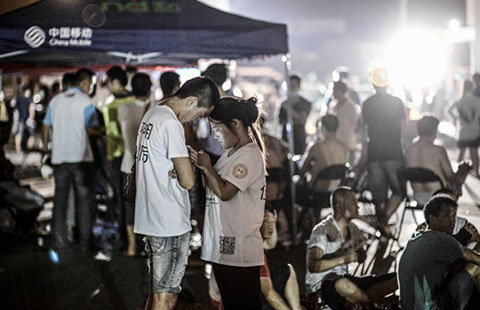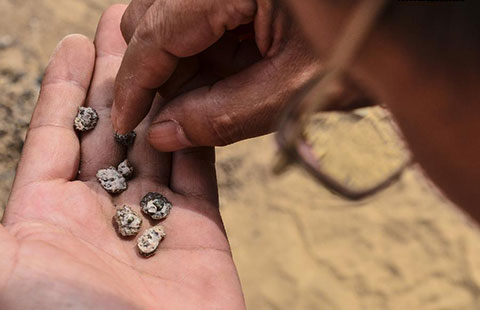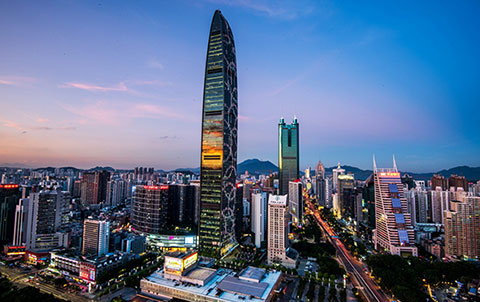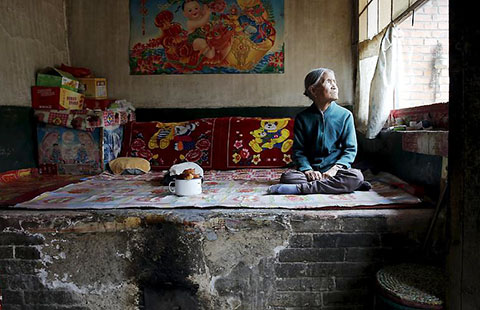Questions remain to be answered about blasts
Updated: 2015-08-17 07:55
(China Daily)
|
||||||||
 |
|
Premier Li Keqiang makes an inspection visit on Sunday to the scene of last week's explosions in Tianjin Port. LIU ZHEN/CHINA NEWS SERVICE |
The Tianjin explosions are the talk of the town, and they will be for many days to come, because of the many questions that remain to be answered.
Smoke could still be seen at the site on Sunday, almost four days after the explosions on Wednesday night. And, so far, 112 bodies have been identified, with 95 people still missing. These speak volumes about how powerful the explosions were. Yet the severity of the blasts goes far beyond the death toll and economic losses they have caused, although both are great.
President Xi Jinping stressed that this bloody lesson must be learned. He required leaders at all levels to place work safety on top of their agenda. This points to the direction of how the aftermath of this accident should be dealt with.
When the entire site will be cleared up remains a question, and whether there is still any potential health threat from toxic gas in the air or contamination of the nearby environment remains to be determined.
Indeed, the very basic and important questions of how many kinds of hazardous materials were involved, and how much of them, are yet to be answered. Any possible danger that may be caused by a chemical will hardly be eliminated unless a complete list of the hazardous chemical materials involved is produced.
This is a top priority. Without knowing the details of the dangerous chemicals that were stored at the site, the clearing up operations will not be able to proceed as smoothly and efficiently as they should.
Even when the site is cleared and the risk of chemical pollution or contamination eliminated, there will still be a lot of work required to produce a clear picture of how the explosions occurred.
A residential block is located only 800 meters away from where the explosions took place. How could such dangerous chemicals be allowed to be stored at a site in such close proximity to these residential buildings?
There is little information about the logistics company, Ruihai, which had housed the hazardous chemical materials in a warehouse at the site. And not surprisingly, the lack of verified information has resulted in conspiracy theories emerging.
These conspiracy theories will build up a head of steam unless the government unravels the mysteries surrounding the incident with a thorough and transparent probe that is able to answer people's questions.
- IS likely uses mustard agent in Iraq attack
- Fidel Castro marks 89th birthday with surprise visit
- Switzerland begins public consultations on joining China-led AIIB
- Malaysia seeks increased trade ties with China
- China salutes veterans of anti-Japanese aggression war
- 5 Japanese ex-PMs show concerns over security bills

 Times Square 'Kiss-In'
Times Square 'Kiss-In'
 School turns into place of shelter in Tianjin
School turns into place of shelter in Tianjin
 Earliest site of coal fuel found in Xinjiang
Earliest site of coal fuel found in Xinjiang
 Top 10 Chinese cities with highest property prices
Top 10 Chinese cities with highest property prices
 Comfort women: Scars have not been healed
Comfort women: Scars have not been healed
 Top 10 places to visit in Tibet
Top 10 places to visit in Tibet
 8 groups yuan depreciation will impact most
8 groups yuan depreciation will impact most-
 Historic kiss on grand scale
Historic kiss on grand scale
Most Viewed
Editor's Picks

|

|

|

|

|

|
Today's Top News
New York event marks war anniversary
Li, 24, runs for House
China, US engage in human rights
China investigates Tianjin blasts, experts focus on chemicals
PBOC promises effective steps for yuan stability
US oil slides to six-and-a-half year low under $42 as stocks build
US believes IS likely uses mustard agent in Iraq attack
12 firefighters among 44 killed in Tianjin explosions
US Weekly

|

|





